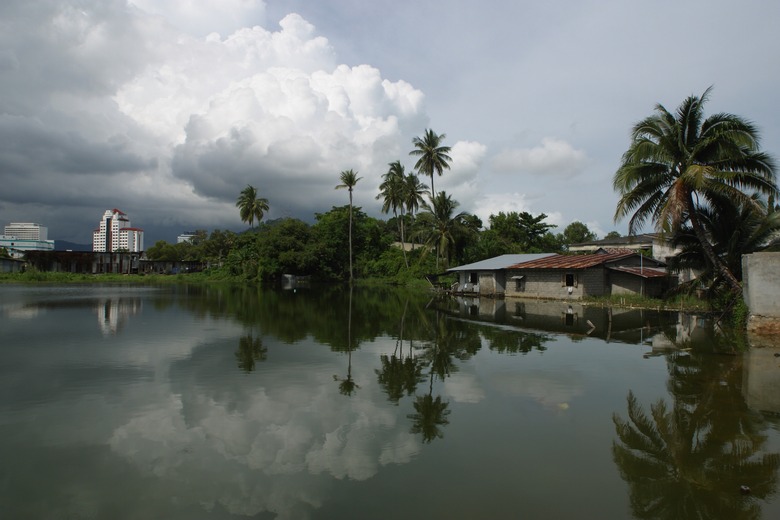Does Humidity Affect Climate?
Earth's climate is controlled by the interplay between the sun's energy, the ocean, land surfaces and the makeup of the Earth's atmosphere. Because the climate is basically the atmosphere's behavior, the atmosphere's composition is a key piece to the climate puzzle. Humidity can have an effect on climate, but the climate can also affect the humidity of a place.
The Greenhouse Effect
The Greenhouse Effect
In general, the fact that Earth has a climate at all is thanks to the greenhouse effect. The greenhouse effect refers to the atmosphere's ability to retain heat. As sunlight warms the Earth's surface, the surface warms and radiates that heat back out. If there were no greenhouse effect, our planet would be uninhabitable.
In a sense, the atmosphere works like a blanket. A blanket doesn't generate heat to keep you warm, it instead does a very good job of trapping the heat your body makes. Similarly, the atmosphere traps heat from Earth's surface before it floats off into space.
The Greenhouse Gases
The Greenhouse Gases
The atmosphere is made of an assortment of different gases. The vast majority of the atmosphere is gaseous nitrogen, which makes up nearly 80% of the air around you. Roughly 20% is the oxygen that you breathe. Neither of these gases is very good at absorbing or trapping heat.
This means that the greenhouse effect is created almost entirely by gases that make up less than 1% of the atmosphere. For being so small, that tiny chunk of the atmosphere has a huge effect.
This portion of the atmosphere is composed of gases like carbon dioxide, nitrous oxide and methane, all of which trap heat exceptionally well. As these gases are released into the atmosphere, the greenhouse effect becomes more intense, which affects global climate patterns.
How Water Vapor Affects Climate
How Water Vapor Affects Climate
One of the biggest contributors to the greenhouse effect is water vapor. About 60% of the atmosphere's heat is held in water droplets suspended in the atmosphere. In this way, humidity can be considered a greenhouse gas.
As such, humidity does have an effect on the climate. Because of water's ability to hold energy, heat plus water can drive severe storms, like hurricanes. However, scientists think about water a bit differently than they think about other greenhouse gases.
Even though humidity affects climate by trapping heat, the difference is that climate, in turn, controls humidity.
How Climate Affects Water Vapor
How Climate Affects Water Vapor
With most greenhouse gases, the amount of heat the atmosphere can hold is related to the amount of greenhouse gas present. With water, the story is a bit different.
Climate affects the amount of water vapor in the air. Warm air, for example, has the ability to hold more water vapor than cool air. As air warms, water evaporates into it, which increases its ability to hold heat. As that air cools back down, water condenses and falls out as rain.
So while water vapor can hold a lot of heat, the air temperature determines how much water can be there. Scientists call this "water vapor feedback."
While water vapor is an incredibly potent greenhouse gas, it only tends to amplify the effects of other greenhouse gases. For example, more carbon dioxide in the air increases the amount of heat in the air, which then allows it to evaporate more water and, in turn, absorb more heat.
Even though changes in climate are attributed to longer-lived greenhouse gases like carbon dioxide and methane, water vapor can multiply the climate effects of those gases.
Cite This Article
MLA
Brennan, John. "Does Humidity Affect Climate?" sciencing.com, https://www.sciencing.com/humidity-affect-climate-23399/. 18 January 2022.
APA
Brennan, John. (2022, January 18). Does Humidity Affect Climate?. sciencing.com. Retrieved from https://www.sciencing.com/humidity-affect-climate-23399/
Chicago
Brennan, John. Does Humidity Affect Climate? last modified March 24, 2022. https://www.sciencing.com/humidity-affect-climate-23399/
